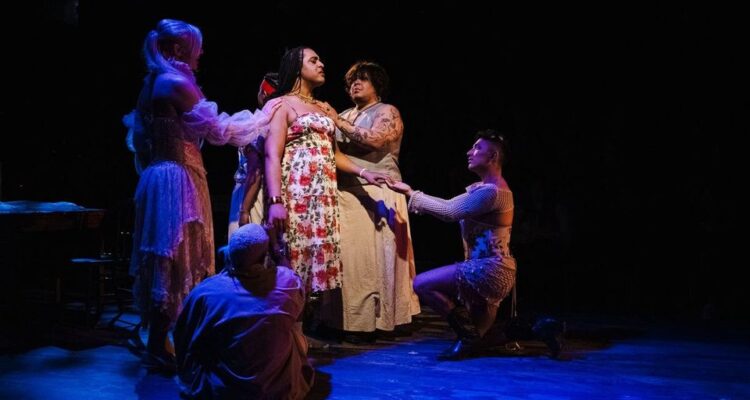In a house of found family, a collection of young queer people lean on each other as they chase their passions, ponder their identities, and reconcile with their pain and their love. Angels and demons (well, one demon) abound at the fringes of their reality. This is House of Telescopes, which playwright Kairos Looney says “asks the audience to imagine a new world that at once cherishes trans people of color and refuses to leave anyone behind.” In a story woven with varying queer journeys and not a little bit of magic, we are invited to listen, understand, and hope for a better future.
The play opens on Fable and a host of otherworldly spirits implied to be the spirits of queer and trans people passed. Fable (Joyah Dominique) is transfemme and is working on a project that she hopes will illuminate the lives of forgotten queer people of the past. As she struggles, the spirits – referred to poetically in the script as Cartographers – watch over her lovingly and sing to her.
Fable lives in a house in Minneapolis with her chosen family, including characters such as Ari, Sherman, and Lila. At the start of the play, Fable’s half-sister Suz is visiting them from Colorado. Suz seems to be the only person from Fable’s family of origin that Fable is still on speaking terms with. As the two sisters discuss, Fable’s mother and other family members still have problems with misgendering and the concept of Fable’s transition as a whole. This pain haunts Fable throughout the play, not just spiritually, but physically. In a bizarre turn, a demon (André Jordan) comes to Fable’s childhood bedroom in Colorado and inhabits all of her childhood paraphernalia – things we see Fable’s mother Daphne cherish as she struggles with accepting Fable. Possessed by the demon, the “saved things” become a living puppet made out of sentient Boy Scout sashes and swimming trophies and old Halloween costumes. It then proceeds to hunt her down (albeit slowly).
House of Telescopes moves around a lot, and not always to its benefit. While the overall effect of the disparate narratives is an emotional portrayal of queer and trans experiences, the multitude of characters and settings doesn’t allow for any one storyline to feel fully fleshed out. While there are some really beautiful tangents that come from following Fable’s roommates (Sherman’s transition journey) and family (Jackson questioning his sexuality), there was much I feel that I still wanted to know about Fable and her spirits that the play never answered for me. While there may be a little too much going on, charismatic performances across the board keep you invested in each character. Joyah Dominique as Fable shines, as do Gwynne Wood as the comforting and charismatic Suz and André Jordan as the hilariously unpredictable “Saved Things.”
In a dramatic and thoroughly poetic climax, Fable must confront the demon in the form of her “Saved Things” to create her own inner peace and to begin to reconnect with her family of origin. House of Telescopes is sprinkled with music and musical numbers, but the final number between Fable and her spirits (who, touchingly, have her back but also push her to fight her own battles when necessary) is the most heart-wrenching. If you are looking for a play that will alternatively lift you, touch you, cry with you and comfort you, the “coming of age transgender fantasia” that is House of Telescopes will be that play.
Written by Kairos Looney
Original music by Aya Aziz
Directed by Lyam B. Gabel
Presented by Pipeline Theater Company
Cast includes: Abdu Garmazi, Al Piper, André Jordan, Daxx, Francesca Fernandez, Gwynne Wood, Joshua David Robinson, Joyah Dominique, Kris Carrasco, La Head, Lisa Stephen Friday, Noa Graham, Rai Gonzalez, Ren King, Trinity G. Ross
Run time: 100 minutes with no intermission
Runs through 27 April 2024

